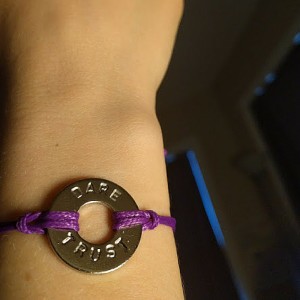Here’s how it happens. It starts when everything is humming along smoothly.
You’ve identified your goals, you’ve broken them down into next steps, you’re plugging away, you’ve got your self-care dialed in and everything is rosy.
Your schedule is full, but not too full. You’re feeling energized, excited. You’re having fun.
And then there comes a moment when it starts to shift.
Maybe it starts at work. Maybe your job becomes a little more stressful than it was before. Or maybe the shift starts at home. Maybe you get sick or someone you care about gets sick or maybe a friend asks you to help them with a project you hadn’t planned for.
Slowly, insidiously, the “extras” creep in — until before you know it, you’re not humming along smoothly at all. Instead, you’re running on a treadmill that just keeps going faster and faster and faster and things are suddenly not so rosy any more.
Or at least that’s how it happened to me.
Cue new year, new goals, fresh energy, and bright plans. Cue increasing work stress, an extra course I signed on for, and a radical commitment to show up differently in the world in 2016.
Lights, camera, action, and… epic fail.
—
I started off 2016 with the very best of plans and intentions. I was looking forward to taking big, bold actions and really showing up in the world in a more courageous way.
But, as usually happens when one makes a grand plan, a combination of unintended consequences and unforeseen circumstances conspired to help me fall flat on my face.
It wasn’t so much that I’d made a bad plan (in fact, I think it was a great plan!), it’s that plans never work out they way we expected them to when we made them.
My mistake was not in planning, but in failing to ditch the plan immediately when it first became clear that it wasn’t working. My mistake was that I struggled valiantly on.
I grappled with stressful deadlines all day at work and then came home to coach clients on the phone. I stayed up late writing blog posts and beat myself up for letting my meditation practice slip when it was pushing 11 pm and the choice was between meditation and rest.
My failure was my choice to engage in the struggle. And I’m going to admit that the results were less than pretty.
—
Due to heightened stress at work, I became less able to handle the stress of a packed coaching schedule outside of work. As my time filled up, my commitment to the routines and practices that replenish me waned, and as my ability to care for myself faded I got angry.
I got angry first at “everything” outside of me, my job, other people’s demands, and so on. I numbed my anger by staying up late catching up on TV shows I stopped watching years ago.
I transferred that anger to myself for “making bad choices” and for “not taking care of myself”.
And finally I got really upset with “the rules” — the systems and structures that I had created in my life. Systems and structures which I had put in place to support me suddenly began to take on an ominous and gloomy feeling.
—
In the end, I did the only sensible thing I could see to do. I took a page out of Brene Brown’s book, Rising Strong, and wrote myself a freaking permission slip which read “Permission to break the rules”. And then I cancelled everything I had “committed” to.
I cancelled sending out my weekly newsletter last Friday. I cancelled keeping up with the telecourses I’m taking. I cancelled some of my available coaching hours. I cancelled everything that felt stressful and aggravating and horrible in my body.
I spent some evenings watching TV, yes — but when I’d watched an episode or two I went to bed instead of staying up until the wee hours. I went to bed before 9 pm some nights and I slept a few ten hour nights.
I started exercising again. I started meditating again. Because I was going to bed so early I actually started waking up in time to meditate in the mornings before work (which I have never before managed to do).
Suddenly I can breathe again. I’m writing again and exercising again and meditating again. I’m sending out my newsletter on Monday instead of Friday and you know what? I gave myself permission to break all the rules but in the end, I’m only three days late.
—
If there’s a lesson in this, I think it’s that there’s no shame in quitting. Sometimes the only way to start moving forward again is to stop trying so hard for a while. Sometimes the only way to figure out what you need is to stop everything you’re doing, so that you can get really quiet and tune in to what it is that you’d actually like to be doing.
I think we get so muddled in the rules that sometimes we wind up missing the forest for the trees. We tell ourselves painful lies about how we should be able to keep our shit together when we feel like we’re falling apart, about how we should be able to handle our situation gracefully, and about how it’s bad of us to skip our meditation or our physical therapy exercises or, or, or.
The kinder, more honest truth is that sometimes life gets ugly and murky and we don’t handle it as gracefully as we’d like to. And that’s perfectly OK too, as long as we’re not telling ourselves a story about how we’re bad people because we fell flat on our face and scraped our knees and now we’re feeling a mix of anger and shame and the petulant need for a cry.
So if you’re like me and you’re off to a shaky start in 2016, I humbly invite you to write yourself a permission slip that reads “Permission to break the rules” — and then go ahead and cancel everything.
I think you’ll be pleasantly surprised by what happens next.
Much love,
Jessica

